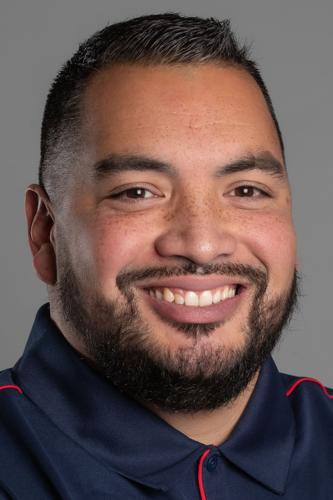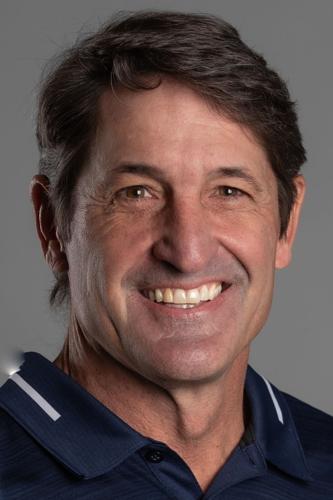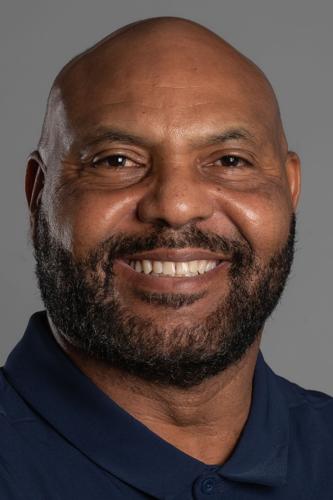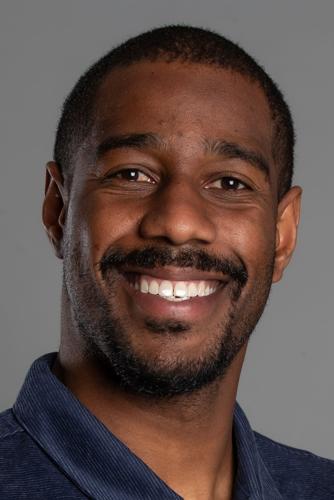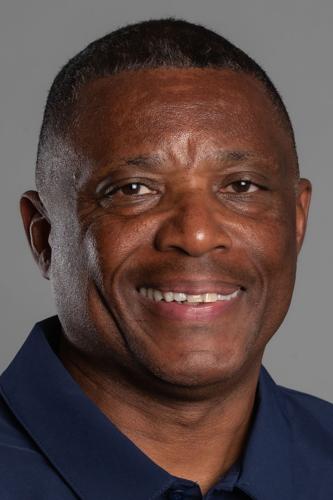The new Arizona Wildcats coaching staff has executed a blitz straight out of the Don Brown playbook.
Despite being limited to virtual contact, Jedd Fisch and his assistants have hit the recruiting trail hard. The UA has offered at least 80 players for the class of 2022, per 247Sports.com’s database. The number exceeds 100 if you include the classes of ’23 and ’24.
Fisch & Co. secured their first pledge for 2022 on Friday, when offensive lineman Grayson Stovall of Hamilton High School in Chandler — a top program in the state whose prospects largely have ignored Arizona in recent seasons — committed to the Wildcats.
They also have been busy finalizing the class of 2021. Two high school recruits and seven transfers have committed to and/or signed with Arizona since Fisch was hired. The latest: South Florida quarterback Jordan McCloud, who announced his move Saturday.
It should become official Wednesday, which is National Signing Day. Most of Arizona’s ’21 class signed in December, before Fisch arrived. The Wildcats have two more openings they can choose to use now or later this year.
How will the staff go about filling those spots? What is its overall approach and philosophy when it comes to recruiting?
We collected the thoughts of nine of Fisch’s assistants on that critical topic.
Don Brown, defensive coordinator

Don Brown’s teams are well-known for bringing pressure.
Brown has coached in college for almost 40 years, guiding some of the top defenses in the nation. He never worked west of Ann Arbor, Michigan, before taking the UA job. But whether he’s on the East Coast, in the Midwest or in the Sonoran Desert, he knows a quality defender when he sees one.
“Highly competitive. Focused on his craft. And has the ability to run. Guys that can’t run in this day and age, when offenses are spreading out, that’s a serious issue.
“I’m not necessarily saying that it’s all about the (stop)watch. But some guys are spectators on the field. If it doesn’t come to their gap, they’re hanging out. You will run, and you will get to the ball. And good things happen when you get there in groups.”
Brennan Carroll, offensive coordinator/ offensive line

Brennan Carroll
Carroll served as the recruiting coordinator at USC and Miami before working for his father, Pete, with the Seattle Seahawks. Although many would consider it “easier” to recruit to those schools than Arizona, Carroll doesn’t view it that way.
“All recruiting will always be based around relationships and developing those relationships with the prospect, parents, family, the ones who are close to them. That’s never really going to change.
“If we were an unknown school, if no one knew about us, I would say that there may be some difficulties in that aspect. But Arizona is a known brand. It’s a fantastic school. There’s been success here in the past.
“We’re trying to make this thing really special. I’m excited about it, and I don’t see anything that’s holding us back.”
Chuck Cecil, safeties

Chuck Cecil
The former UA All-American coached in the NFL for over 15 years before returning to his alma mater in 2017. But as an off-field analyst for most of that time, he has minimal experience as a recruiter.
“Obviously, that is the newest thing for me, the whole recruiting process. In the NFL, you pick them, you draft them. ... But I can’t wait to go to the high schools and talk to the coaches.
“To be able to take kids from high school and then be able to develop them and make them better men and better football players here at the University of Arizona is exciting for me.
“The sales pitch is pretty simple: The University of Arizona, it’s a hidden gem. You don’t go through Tucson to go anywhere. You’re coming to Tucson.
“Trying to convince a kid to come here really, to me, isn’t that hard. Once they get here, man, it’s hard to beat.”
Kevin Cummings, wide receivers

Kevin Cummings
The youngest coach on staff, Cummings, 30, played and coached at Oregon State and came to Arizona from San Jose State. Those are schools that have to identify under-the-radar players who can be developed.
“You can find players anywhere across the country. I’ve been primarily in California. But there’s even some spots in California where people don’t think you can find good players. But there are.
“The I.E. (the Inland Empire, east of Los Angeles) is an area that we can hit strong. We found some really good players at San Jose State in the I.E. area. The San Diego area has some fantastic football players, as well as the Bay Area. Sacramento ... that’s also a (place) where at San Jose we had some guys that were under-recruited who started for us, who were all-conference players for us.
“So we’re gonna search far and wide to make sure we got find the guy that fits what we’re trying to do. There’s no limits to that.”
Jimmie Dougherty, passing-game coordinator/ quarterbacks

Jimmie Dougherty
Dougherty has worked up and down the West Coast, from San Diego to Los Angeles to San Jose. He came to Arizona to reunite with Fisch. Dougherty’s father, Tim, is the defensive coordinator at Hamilton.
“The biggest thing with recruiting, to me, is ... relationships. The relationships you have with the high school coaches. Having that background of being raised by a high school coach, knowing how important that is.
“That’s where it all starts for us in the recruiting world. And then it filters into making sure that we get the right kind of players, the right kind of people that we want in this program.
“I look forward to that. There’s so much to sell here. You’ve got the great tradition with this football program. You have a great college town, a great city in Tucson to recruit these kids to. ... And letting guys know when they come here to play football, they’re going to be coached by the best.”
Scottie Graham, running backs

Scottie Graham
Graham, a former NFL running back, is new to on-field coaching and recruiting. After hanging up his cleats, he worked for the NFL Players Association and in administration at Arizona State. But Graham has made countless connections over the course of his career, and he knows what he’s looking for in a recruit.
“I like smart players. I like players that inspire to do more, have hobbies, play different sports. And be a good fit culturally, because you win with good people. We want people to fit our culture.
“One thing that is unique about running backs, they’ve been running backs their entire lives. So for me, it’s just to make sure I polish it — steer it in the right direction. I want to align them, know their assignments, want them to be themselves. And once they get to the secondary, use their God-gifted talent to get them to the end zone.”
Ricky Hunley, defensive line

Ricky Hunley
When Hunley — like Cecil a UA All-American and College Football Hall of Famer — came to Arizona in 1980, the Wildcats weren’t the consistent winners they would become under Larry Smith and Dick Tomey. The program is down now as well. But that can be advantageous if pitched properly.
“This place, the facilities, it’s all first class. We can compete on any level with any school as far as the bells and whistles. The thing that we can offer that probably other people might not have ... we’re so far down that we can’t go anywhere but up.
“People on the outside looking in (can) say ‘Hey, that’s a great opportunity for me to go to a place where I can make a sudden impact.’ I came to Arizona because I had an opportunity to play early.
“Any player who’s out there who thinks that he can contribute and help this program to be successful, he’s got an opportunity to come in here right now and compete for a starting job.”
Jordan Paopao, tight ends/special teams

Jordan Paopao
Paopao could be the conduit for Polynesian players to dot the UA roster the way they did under Tomey. Paopao even joked, “You didn’t know that all Polynesian guys are related?” He also was a top recruiter for Washington and UNLV. His territories included Arizona.
“There is damn good football in the state of Arizona. Coach Fisch was talking about building the gate around it, but, ultimately, it’s being able to consistently and meticulously recruit at all times. Not just making scholarship offers and then ... you don’t hear from them for a while. What happened to the staff at the University of Arizona?
“It’s that constant communication with parents, with kids, with coaches, letting them know exactly where we’re at in terms of the state of the program and how we’re going to make sure that we get this better. And then (it’s) fostering those relationships.
“I’ve always loved recruiting the state of Arizona. Where else do you get 50- to 60-degree weather in the middle of January?”
DeWayne Walker, cornerbacks

DeWayne Walker
Walker coached in college and the NFL for most of the past 30 years. He spent 2020 training young defensive backs near his adopted home in Buckeye, where he rediscovered the joy of connecting with and developing young people after spending the previous seven years in the NFL. Before that, he served as the head coach at New Mexico State, one of the hardest programs to recruit to in America.
“You just have to be resilient. You have to believe in your plan. You just have to stay on the grind. Not get so caught up on what you don’t have and what other people have. You just have to put your plan together and just grind every single day.”







